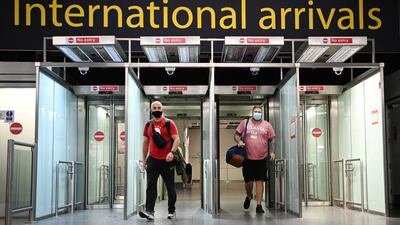Transport Secretary Grant Shapps admitted that the UK's traffic light list for travel could be unpredictable, but committed to keeping the latest changes in place for the remainder of August.
It came as UK politicians face pressure to remove confusion and uncertainty from the traffic light system.
The plea from the travel industry came as ministers abandoned plans to create a new “amber watchlist” to warn travellers not to visit destinations such as Spain.
Prime Minister Boris Johnson promised to "get the the travel industry moving again".
What are the green, amber and red lists?
Under the current rules, fully vaccinated travellers can return from amber list countries without quarantining, but those returning from red-list countries must pay £1,750 ($2,432) to spend 10 days in a government-approved hotel.
Unvaccinated passengers returning from amber countries need to self-isolate at home.
Any passenger returning from a green list country is not required to quarantine when they land in the UK. A separate green watchlist identifies the countries that could suddenly change from green to amber.
All travellers are required to take a pre-departure test and another two days after landing in the country.
What countries have turned from red to amber?
The UAE and Bahrain will be removed from the UK's travel red list, the British government announced on Wednesday night, providing a major boost to tourism and allowing families to be reunited.
They will join other amber list countries, meaning that people entering the UK from these points of origin do not have to pay to quarantine in a government hotel for 10 days.
The UAE was placed on the red list in late January. A decline in infections, a high vaccination rate and greater clarity on the virus strains means the UAE and Bahrain, with India and Qatar, will move from red to amber at 4am British Summer Time on Sunday, August 8.
Which countries turned green?
The Department for Transport stated it was “cautiously reopening international travel” by adding Germany, Austria, Slovenia, Slovakia, Latvia, Romania and Norway to the government’s green list for travel.
Travellers from those countries do not need to be vaccinated but must present a negative Covid test within two days of arrival.
Can the rules change?
Mr Shapps said the changes would remain in place for the remainder of August, but said that the situation could change after then.
"We've certainly lived with coronavirus long enough to know it can be unpredictable. However, we’ve also lived with it long enough to get the majority of the population vaccinated," he told BBC's Radio 4 Today programme.
"That does mean this summer we’re able to set out a three-week programme rather than one week, which was the situation last year.
"I’m hoping people will be able to go away under the simplified system, enjoy their breaks, not be looking over their shoulder the whole time and, as long as they follow the processes, they can have a great time."
What is the ‘amber watchlist’?
Ministers had been planning to introduce an amber watchlist to warn countries at risk of turning red at short notice, with arrivals having to quarantine in hotels.
But the idea was scrapped after a backlash from the travel industry, which argued holidaymakers could be deterred from going abroad.
Before abandoning the new designation, Mr Johnson said: "We must try and stop variants coming in, must stop importing variants from abroad, so we have to have a balanced approach.
"What I want to see is something that is as simple and as user friendly for people as possible."
At the weekend, the proposal to expand the number of travel categories caused a split among Cabinet ministers, some of whom argued that popular holiday destinations such as Spain could be put on the red list at short notice.
The special restriction placed on France, which was placed on the amber plus list, requiring passengers to self-quarantine for 10 days, even if they had been fully vaccinated, has been removed.
But, Georgia and Mexico, along with the French-run islands of La Reunion and Mayotte, have been added to the red list.
Why is the traffic light system causing tension?
Chancellor Rishi Sunak warned Mr Johnson that the UK’s travel restrictions were “out of step with our international competitors” and were putting a brake on the economy.
Mr Sunak is said to be calling for the UK to take advantage of its successful vaccination programme by opening up further.
It was the latest salvo in the battle over Britain’s border policy, with France last week accusing the UK of discrimination after it was placed on the so-called amber-plus list owing to the spread of the Beta variant.
This meant the quarantine exemption for the fully immunised was scrapped and those returning from France had to isolate for 10 days.
What does the travel industry say?
Heathrow Airport boss John Holland-Kaye said on Monday the industry wanted certainty for travel rules.
“We need to simplify as much as we can to enable more people to travel,” he told BBC Radio 4’s Today programme.
He urged ministers to use the dividend from the vaccination drive to reopen travel.
“We should be able to at least catch up with the Europeans,” he said.
“The UK should be showing that if you get vaccinated you can get your life back to normal.”
How has the traffic light system changed over time?
A significant change took place on Monday when the rules were tweaked to allow people fully vaccinated in the US and EU to avoid quarantine.
Previously, only people vaccinated in the UK could benefit from quarantine-free travel.
The government has said it plans to loosen quarantine arrangements for "like-minded" countries in coming months.
What did Boris Johnson say?
Mr Johnson warned would-be holidaymakers that Covid-19 was still dangerous.
"We must try and stop variants coming in, must stop importing variants from abroad, so we have to have a balanced approach," he said.
















